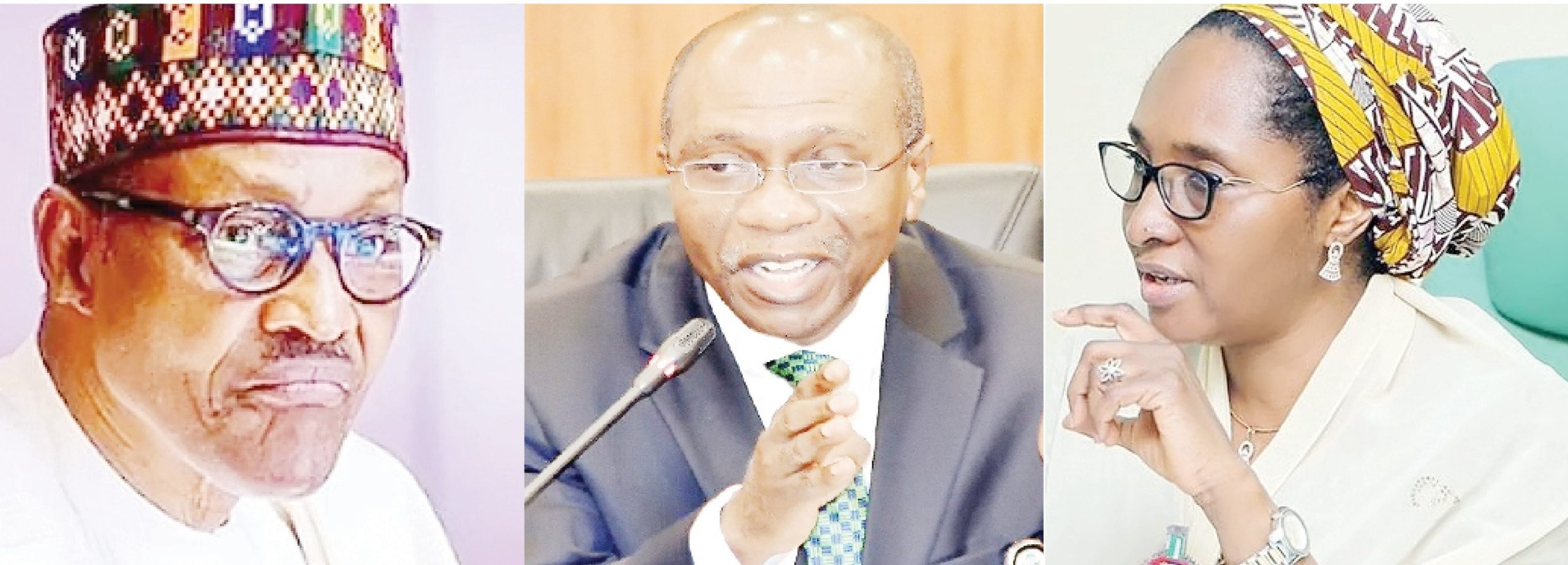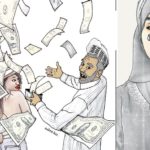‘So far in 2021, the naira has weakened by 3.40per cent at the parallel market and currently trades at N495/$.’
The President Mohammadu Buhari-led administration commenced its second term on May 29, 2019 to terminate on the same day in 2023. CHIMA NWOKOJI undertakes an assessment of how the administration has delivered on leadership and living standard for Nigerians.
In his inaugural speech for second term in 2019, President Muhammadu Buhari promised that in the next four years, the administration would remain committed to improving the lives of people.
He said: “We possess all ingredients of a major economic power on the world stage. What we require is the will to get our acts together. With leadership and sense of purpose, we can lift 100 million Nigerians out of poverty in ten years.”
He recalled that in 2015, the campaign focus was security, economy and fighting corruption. Two years after these promises, can Nigerians attest to their fulfillment? Are the lives of the majority improving or experiencing signs of improvement?
Agreed that the last two years were turbulent for two major occurrences – recession and coronavirus pandemic, is the government’s body language showing signs of commitment to improving the lives of the people?
While answers to these questions may vary, a number of economic and finance experts, based on available data, have given sufficient insights into the realities.
Policies in the past 6 years
Six years ago, the Buhari government initiated the Medium Term Expenditure Framework (MTEF), the Economic Recovery and Growth Plan (ERGP), debt management plans and the Treasury Single Account (TSA) as templates for various policies and programmes’ implementation to alleviate poverty and address unemployment, insecurity and other socio-economic problems.
While some economic watchers say Nigeria’s economy has not fared any better, others believe it has achieved some modest gains considering the not-so-impressive revenue position the Buhari government met.
In June 2020, the Vice President Yemi Osinbajo-led Economic Sustainability Committee (ESC) submitted its report with the Federal Executive Council approving it as the Economic Sustainability Plan (ESP). The N2trillion ESP is now being implemented by the Federal Government today. The ESP includes several packages like MSME Survival Fund, Youth Fund, Mass Housing Programmes, massive agric plan and Solar installations. An impartial assessment of some parameters will suffice.
The Corporate Affairs Commission (CAC) had, since the wake of the Buhari government in 2015, initiated some reforms, including 24-hour online registration of businesses, digitalisation of legacy records and partial automation of post-incorporation filings from state offices to reduce turnaround time and reduce costs.
In July, 2016, President Buhari set up the Presidential Enabling Business Environment Council (PEBEC), a policy which resulted in not just simplifying the processes of business registration in Nigeria, but also in pushing Nigeria 15 places up on the World Bank ease of doing business index to the 131th position in 2019 from the 146th in 2018.
The Central Bank of Nigeria (CBN) in 2019 approved a loan of N19.18 billion to nine cotton-producing firms so as to guarantee steady off-take and processing of cotton lint and cotton seeds.
President Buhari also directed the Ministry of Industry, Trade and Investment to establish agro-allied industries in all the 36 states to further enhance growth of the textile industry.
To support local manufacturers and reduce the negative impact of smuggled goods into the economy, President Buhari, in August, 2019, ordered the closure of the nation’s land borders.
Gross Domestic Product
In 2019, the GDP growth rate peaked at 2.27 per cent despite the not-too-supportive environment for businesses. The Minister of Finance, Budget and National Planning, Mrs. Zainab Ahmed, attributed the growth largely to non-oil sector growth.
In the last one year (Q1’20), the country then was not in a lockdown and the economy enjoyed a modest growth of 1.87 per cent. In Q2 2020 GDP growth was -6.10per cent but improved to -3.62per cent in Q3 2020, based on the +1.87per cent GDP growth in Q1 2020.
In contrast, the economy expanded by 0.51per cent in the first quarter of 2021 (Q1, 2021) after growing by 0.11per cent in Q4, 2020 and 1.87per cent in the corresponding period in 2020.
However, the Q1 numbers reveal weak and slowing growth in 2 key sectors of the economy – Agriculture and Telecommunications – which together account for 31.24per cent of GDP.
With 0.51 per cent growth in Q1’20, the Nigerian economy will now need to expand by an average of 3.15per cent over the next 3 quarters to achieve the IMF’s forecast.
Economists describe ‘Recessionary Gap’ as a situation where the real (actual) production or Gross Domestic Product is lower than potential GDP. The International Monetary Fund (IMF) expects the country to grow by 2.5 per cent in 2021 while potential GDP is estimated at 8.0 per cent, resulting in a recessionary gap of 5.5per cent.
Chairman of Fidelity Bank Plc, Mustafa Chike-Obi, in a chat with Saturday Tribune, said Nigeria should focus on GDP growth and stop spending energy on irrelevances.
He said: “If we are not growing our GDP at 10 per cent or higher for the next 10 to 15 years, we would never get the kind of national wealth that would lead the masses out of poverty. Anything else is trivial.
“People talk about corruption all the time and I did a calculation, the maximum amount of money that is possible to steal from the federal government is an easy calculation and it’s about N500-N800 billion.
“But one per cent of GDP growth is roughly N1 trillion. So we are spending all our energy, focusing on N500-N800 billions c of possible corruption and ignoring the fact that if we grow our GDP by three or four per cent higher, the national wealth that would accrue to us is about N5 trillion.”
Renowned economist and Managing Director, Financial Derivatives Company (FDC) Limited, Bismarck Rewanes’ said the numbers reflect the negative impact of increased insecurity and stringent government policies on major sectors of the economy. “They can also be partly attributed to base year effects as the negative effects of COVID still lingered,” he said.
A lecturer at the Lagos Business School (LBS), Dr. Bongo Adi, who is not too impressed about the current micro and macroeconomic indices of the economy, said the Federal Government must get the right policy tools to get the economy back on track, especially during post-COVID-19 pandemic.
Exchange Rate
In June 2019, the CBN gave a signal that it would allow the naira to weaken past its official rate as it began a step-by-step move to stop the regime of multiple exchange rate windows.
Checks on the apex bank’s its website showed that the bank stopped publishing the fixed naira exchange rate, implying that the rate will be “market-determined.’’
The central bank used to have an official rate as strong as N305 per dollar in that year. That rate was used to ensure that some traders, other genuine travelers including fuel importers, got cheap dollars
Close to two years after, the CBN on Friday, May 14, 2021, again erased the exchange rate from its website that for about a year was seen as the government’s official rate.
Since the first quarter of 2020, Nigeria has faced an exchange rate crisis triggered by the drop in oil prices. It started after two of the world’s largest oil producers, Saudi Arabia and Russia, disagreed on how to proceed concerning oil supply cuts, which triggered a price war that pushed oil prices to crash to as low as under zero dollars.
The CBN removed the official rate of N379/$1 from its website following announcement by the Finance Minister (in March), that the official rate had been scrapped and the Nigerian Government had adopted the NAFEX exchange rate as the official rate of conversion for FAAC allocations.
With this move, the NAFEX rate is now regarded as the default rate for all official and legitimate transactions. This means that all government inflows will now be monetized at the NAFEX rate (currently at N410/$).
Analysts say this is a major move towards convergence and a possible unification of exchange rates while also meeting some of the lenders’ preconditions of the $3billion Eurobond issue. A change of foreign exchange policies is also a major conditionality for the World Bank to approve a $1.5billion loan to the Nigerian government.
The NAFEX rate is the closest to a market-driven exchange rate and is referenced by both the private and public sector for official transactions. While the NAFEX rate is already reflected in FAAC disbursements, external debt service obligations for state governments, which were previously calculated at the exchange rate of N379/$, will rise by 8-9per cent .
So far in 2021, the naira has weakened by 3.40per cent at the parallel market and currently trades at N495/$.
Foreign reserves
Available data show that in the face of all odds, the government’s monetary policy measures helped in growing the foreign reserves from about $28.6 billion in June 2015 to about $40.3 billion as of May 11, 2020. As of May 17, 2021, the foreign reserves stood at $34.43 billion, data from the CBN website showed.
The reserves decline compared to May 2020 levels has been attributed to drop in diaspora remittances due to patronage of illegal remittance channels.
To reverse the trend, the CBN Governor, Godwin Emefiele, announced continued implementation of the ‘Naira for Dollar’ scheme, which gives N5 rebate for every $1 sent by Nigerians in diaspora to the country.
Previous foreign reserves movement showed that, on April 1, this year, the reserves stood at $34.85 billion, representing $404 million increase compared to $34.41 billion on March 11, 2021.
Subsidy
The Federal Government, two years ago (2019), spent N1.5 trillion on fuel subsidy, but said there was no provision in the revised 2020 budget as Nigeria cannot afford the cost. However, in the first quarter of 2020, the Nigerian National Petroleum Corporation (NNPC) spent N535.9 billion on subsidy and Federation Account Allocation Committee
Nigeria is dependent on oil receipts for over 60 per cent of government revenue and 90per cent of foreign exchange earnings. Yet the country is unable to refine enough crude oil domestically to meet demand and relies on imports to address the shortfall.
On the one hand, the government earns more revenue from higher oil prices but then spends a significant amount of that revenue to subsidize the country’s fuel needs.
The corporation reportedly now spends over N120billion monthly subsidizing fuel, an act that is no longer sustainable. Government revenue is now facing major uncertainty under the weight of the fuel subsidy payments as the NNPC has indicated that it would be making no remittances to the Federal Accounts Allocation Committee (FAAC) for April and May after accounting for fuel subsidy payments from its revenue.
Some analysts have applauded the executive for its determination to pass the Petroleum Industry Bill (PIB). The likely passage of the PIB is a plus. This will bring clarity to fiscal incentives and boost investment in the sector. This will also strengthen Nigeria’s fiscal and external picture, which will support growth in other exchange rate–sensitive sectors of the economy.
Inflation
In 2020 and Q1 2021, issues like structural bottlenecks, insecurity, and the effects of the border closure in Nigeria led to a spike in inflation. As at March 2020, Nigeria’s inflation rate was 12.2 per cent. It rose by 12.82 per cent in July 2020, and now 18.12 per cent. With the latest figure of inflation at 18.12per cent, food inflation as of April 2021 at 22.75per cent, analysts believe that the two key scenarios above would shape the direction of inflation in the year.
Mr. Ebo Ayodeji, the Head of Retail Investments, Chapel Hill Denham, disclosed this in a recent discussion on “Rising Inflation: Implications For the Nigerian Financial Market”.
To ease the pressure on the inflation, the government in its Finance Act 2020 announced the reduction in duties on tractors from 35 to 10 percent, from 35 to 10 per cent on vehicles for transportation of goods; and 35 to 5 per cent on vehicles for transportation of persons (cars).
Speaking on the implications for the financial and capital market he said that investors would be forced to seek investment opportunities that could give higher returns because of the erosion of their purchasing power by inflation.
The country’s inflation rate rose persistently throughout 2020, climbing from 12.13 per cent in January to 14.89 per cent in November 2020, suggesting that the average households’ disposable income took a dive.
This implied a fall in the welfare of Nigerian households as prices of essential goods and services continued to rise in the year. For example, the prices of medical services, hospital services, passenger transport by road, hairdressing salons, paramedical services, and pharmaceutical products recorded significant increases during the year. Furthermore, essential food items such as bread and cereals, potatoes, yam & other tubers, meat, fish, fruits, vegetables, oils & fats became out of reach for some middle- and low-income earners as food inflation rose significantly from 14.67per cent in January 2020 to 18.3% in November 2020.
Household consumption was worsened by the COVID-19 pandemic, as well as other government policies in 2020. According to the National Bureau of Statistics (NBS), household consumption expenditure declined Y-o-Y by -0.08per cent in Q2 2020. Household consumption declined from N10.134trillion in Q2 2019 to N10.126trn in Q2 2020. While in Q1 2020, household consumption expenditure declined Y-o-Y by -4.03per cent, as it declined from N9.53trillion in Q1 2019 to N9.147trillion in Q1 2020.
Debts
Analysis of Nigeria’s debt stock in the past few years reflects a worrisome trend with borrowings increasing while the nation’s re-payment capacity appears to be waning on yearly basis. More worrisome still according to some analysts, is the lack of evidence that the borrowed funds are being properly utilized.
As of December 31, 2019, Nigeria’s public debt stock stood at $84.052billion (about N27.401tn) from the about $63.806billion or N12.11trillion in June 30, 2015. At the end of 2020, Nigeria’s total debt stock (national & sub-national) stood at N32.9tn (or $86.8bn).
In his assessment of the performance of Nigeria’s economy since 2015, an economist and research analyst at Augusto & Co. Mr Olujimi Ogbobine, said the country was currently in a dire fiscal problem. Despite the positive spin about Nigeria’s moderate debt to GDP, interest payments as a percentage of revenue are too high. At this level, several multi-latheral agencies, especially the World Bank have warned against the danger of such huge interest payments.
Recently, President Buhari submitted a request for the approval of additional N2.3 trillion ($6.2bn) worth of external debt to the senate. According to the request, the loan is aimed at part-financing the N5.6trillion budget deficit for 2021 with critical focus on funding capital expenditure.
Last year, the Federal Government relied heavily on a slew of borrowings largely from multilateral organizations such as the IMF, World Bank and AfDB. The huge reliance on the debt market was necessitated by shocks to revenue generation.
The government has justified its rising debt profile by the compliant debt-to-GDP ratio of less than 30.0 per cent. However, the concern remains Nigeria’s rising debt sustainability risk and the fact that borrowing to finance consumption amounts to fiscal suicide.
United Capital analysts reiterate their position that the Federal Government’s debt service cost as a percentage of revenue is a fairer reflection of the country’s debt sustainability position. The problem is that government is spending too much from its little revenue in servicing debts.
Recently, the pandemic-driven revenue shock has exacerbated the already precarious debt service cost to revenue ratio. For every N100 earned by the government, about 80 per cent of it was spent servicing debts in 2020 as against historic average of 55 per cent.
“Thus, while we recognise deficit spending as a critical fiscal policy tool to drive economic recovery, we think the Federal Government can no longer ignore the associated debt sustainability risk,” the analysts said.
YOU SHOULD NOT MISS THESE HEADLINES FROM NIGERIAN TRIBUNE
Fake Website Asking N-Power Candidates To Verify If They Have Been Shortlisted For N30,700 Grant
CLAIM: A viral post on WhatsApp is asking N-Power candidates to verify if they have been shortlisted to receive ₦30,700 Batch C grant
VERDICT: FALSE. Registration can make you lose your WhatsApp account to scammers.
FULL TEXT: A viral post on WhatsApp is asking N-Power candidates to verify the status of their application and see if they have been shortlisted for the batch C cash grant…
Killer Herdsmen: Untold Story Of Ibarapa’s Worst Nightmare + VIDEOS
“Please do not talk to my father. He is yet to come to terms with the death of his son. It is a most tragic experience. How does one quantify the loss of a dear brother? My brother was killed like an animal by two herdsmen. His offence was that he asked them to drive their cows off his already cultivated farmland,” Bisi Olaosepin, whose brother was hacked to death, struggled to hold back his tears as he relayed to Sunday Tribune the horrible experience that culminated in the passage of his brother…
Rays of the afternoon sun pelted her head as she fanned the embers beneath the half-cut iron drum with the smoke permeating the air. “This smoke is unbearable, Iya Maria,” said one of the three neighbours conversing under a makeshift shed about five meters away. Their voices rose and fell intermittently…Nigeria records 63 new COVID-19 infections, total now 166,254






